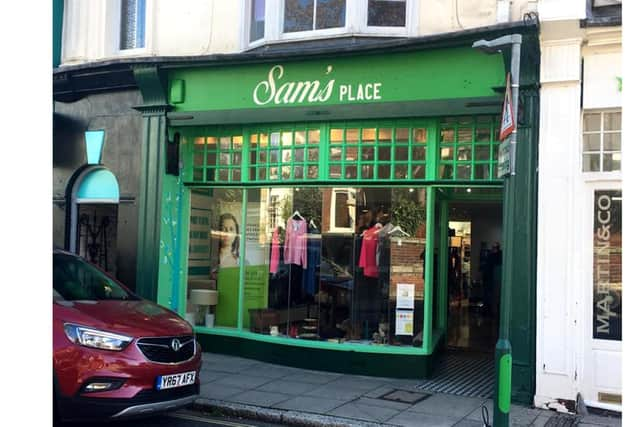Coronavirus 'exacerbating existing conditions' for Samaritans callers as Portsmouth service manages to operate at normal levels despite pandemic
and live on Freeview channel 276
But the longer restrictions in society are in place the ‘more problems’ there could be, according to branch director of Portsmouth and East Hampshire Samaritans Brian Stevely.
The coronavirus pandemic has created obstacles for the 120 volunteers who operate from the London Road, North End, branch - not least the reality that nearly half of staff have been forced to self-isolate.
Advertisement
Hide AdAdvertisement
Hide AdBut younger members of the team, many of whom on furlough from their paid jobs, have ‘stepped up’ and taken on extra shifts to make sure the service, which takes 30,000 calls a year, is running to its normal levels.


‘Phoning the Samaritans remains the most popular way of getting in touch to discuss problems along with email so although we’ve had to stop our face to face service we have still been able to run fairly normally,’ Mr Stevely said.
‘I wouldn’t say we are getting more calls than normal. As soon as you put the phone down it rings again. That’s normal for us.’
Loneliness and isolation have become even more prominent issues in society following the coronavirus outbreak but despite this there has been no real change to how things were pre-lockdown.
Advertisement
Hide AdAdvertisement
Hide Ad‘The type of calls we are receiving are no different to what we normally receive - I’ve not noticed a marked change,’ Mr Stevely said. ‘Loneliness and isolation are big issues at the best of times.’


But he warned: ‘Who knows what can happen if things carry on for weeks or months. Lockdown has seen people deal with things differently - some see it as a positive and some see it negatively.
‘But the more lockdown goes on the more problems there could be.’
Although based in Portsmouth, the branch fields calls via its distribution system from all over the UK and across the world from people needing a friendly ear
Advertisement
Hide AdAdvertisement
Hide AdMr Stevely says the perception of Samaritans is not always totally accurate. ‘You don’t need to be suicidal to call us,’ he said.
‘To get to the stage where you are suicidal is a long process. By talking to someone we help to stop them getting to that point.
‘Most people we speak to are depressed, suffering with bereavement, isolation and having no social support. We don’t give out advice, we just try to guide people to think for themselves and fix their own problems.
‘Most of the time they just want someone to listen to them.’
Advertisement
Hide AdAdvertisement
Hide AdThe job is challenging. That’s why shifts are limited to three hours, typically once a week, although helpers, classed as key workers, have been doing two or three shifts a week during the pandemic following a 40 per cent reduction in volunteers, due to them isolating.
A strong support system is also in place to help those on the end of the phone. ‘There’s always at least two of us at the centre to support each other and a third volunteer is at home who you phone at the end of a shift to talk about anything that worries you,’ Mr Stevely said.
‘There are tough calls. There isn’t one of us who hasn’t been upset at some point. We are all human.
‘We have this support in place because if our volunteers are not in a good place then they are no good to helping anyone.
Advertisement
Hide AdAdvertisement
Hide Ad‘We have volunteers who have been there 40 years and others for two years who decide they need a break from it. It’s not a job everyone can do - emotionally some people can’t deal with it.’
A rigorous process of recruitment ensures volunteers are equipped to carry out the demanding job but it also takes time. ‘A big problem in the branch is getting volunteers through the process,’ Mr Stevely said.
The process involves an interview where people are asked how they would deal with different scenarios before embarking on six weeks of face to face training and then up to seven shifts on the phone with an experienced volunteer.
Mr Stevely says it is appropriate to single out volunteers for their ‘fantastic contribution’.
Advertisement
Hide AdAdvertisement
Hide AdThe branch director also says the job is rewarding. ‘It is an absolute privilege when someone tells you: “I’ve not told this to anyone before.” I’m not sure satisfying is the right word but it is nice to help people,’ he said.
The branch offers outreach support to schools and veterans which has been forced to halt during the coronavirus outbreak.
Samaritans also offers support to organisations such as Network Rail and Queen Alexandra Hospital.
The charity’s increasing reach to help people also saw it open a new charity shop called Sam’s Place in Grove Road, Southsea, in September last year.
Advertisement
Hide AdAdvertisement
Hide AdThe location offered a lifeline for many with it hosting workshops and a place to drop in for a drink and meet others. Those attending often donate some money, which helps keep the branch afloat.
‘All our funding has dried up - we have to raise everything ourselves,’ Mr Stevely said. ‘Sam’s Place has been a big help to us and people have been brilliant supporting it, but obviously it has been closed since lockdown which has made things difficult.’
It is now hoped Sam’s Place will reopen on June 16.
A spokesman for Samaritans said: ‘With over 20,000 volunteers and 200 branches, Samaritans is a charity working across the UK and Ireland to offer emotional support round the clock for people who are struggling to cope with how they’re feeling or with life’s challenges.
‘Our volunteers are busy 24 hours a day, 365 days a year and this hasn’t changed during the pandemic. We are currently providing emotional support over 7,000 times a day (via phone, email and letters) and one in three calls for help to Samaritans are about coronavirus with people feeling anxious and distressed.
Advertisement
Hide AdAdvertisement
Hide Ad‘We are continuing to hear about struggles with mental health, access to services, and the impact on people around basic needs such as food, housing and employment. Coronavirus and lockdown are exacerbating callers’ existing conditions – mainly anxiety, but also depression, Obsessive Compulsive Disorder and others too.’
Anyone needing help can contact the branch on 116 123 or 0330 094 5717.
A message from the Editor
Thank you for reading this story on portsmouth.co.uk. While I have your attention, I also have an important request to make of you.
With the coronavirus lockdown having a major impact on many of our advertisers - and consequently the revenue we receive - we are more reliant than ever on you taking out a digital subscription.
Subscribe to portsmouth.co.uk and enjoy unlimited access to local news and information online and on our app. With a digital subscription, you can read more than 5 articles, see fewer ads, enjoy faster load times, and get access to exclusive newsletters and content. Visit our Subscription page now to sign up.
Our journalism costs money and we rely on advertising, print and digital revenues to help to support them. By supporting us, we are able to support you in providing trusted, fact-checked content for this website.
Comment Guidelines
National World encourages reader discussion on our stories. User feedback, insights and back-and-forth exchanges add a rich layer of context to reporting. Please review our Community Guidelines before commenting.